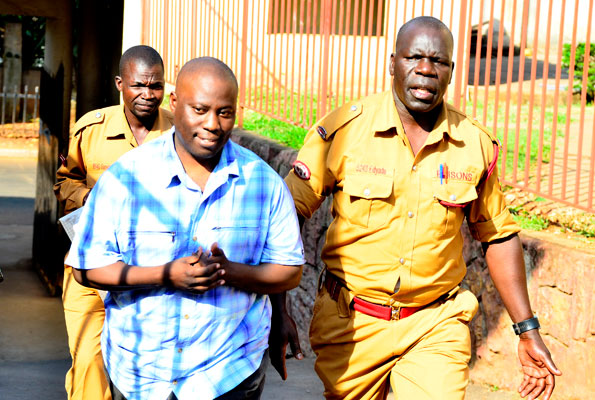Ugandans were Wednesday left in awe when Anti-corruption court judge Lawrence Gidudu ruled that Geoffrey Kazinda be fined only 7 million for stealing shs 300 million.
The judge hinged his judgment on the fact that Kazinda has spent a long time in prison- over 10 years and therefore its meaningless to add him more years.
Gidudu made the declaration shortly after finding Kazinda guilty on three counts of embezzling a total of Shs 306.8 million which was a property of the government of Uganda and was part of the Peace, Recovery and Development Plan (PRDP) funds for West Nile and northern Uganda.
The judge found that the said monies were stolen by Kazinda, who made false accountability showing that it had been requisitioned in April 2011 to hold regional consultative meetings when actually there was no meeting that took place.
The former principal accountant in the Office of the Prime Minister (OPM) was convicted in 2013 for corruption and stealing government funds.
After Kazinda was found guilty, state attorney Harriet Ongom asked court to hand him a maximum sentence of 14 years and direct him to refund the stolen monies in question.
Ongom argued that this was because Kazinda is not a first-time offender and has been convicted several times on related offenses.
On his part, Kazinda told court that it’s not true that he is a repeat offender arguing that he has been in prison since 2012 and that these charges were instituted against him in 2018 when he was already in jail.
As such, in his decision, Gidudu agreed with Kazinda that it’s not true that he has been in and out of prison for him to be regarded as a repeat offender.
He indicated that he would have given him a custodial sentence of five years out of those provided for but it will not make any sense in sending him to jail since he has been there for long to the extent that prison has become like his place of abode.
But judge’s pronouncement could leave the Temple of Justice with an egg on its face as the public wondered whether murderers, rapists and other convicts shouldn’t be sent home considering the time they have spent in jail.
A number of Ugandans took to social media to express discontent in the judiciary for the ruling is likely to amplify broad-day theft, corruption and misuse of government offices by civil servants when they are well aware that Courts will declare them free just like Kazinda.
The concerned citizens are therefore asking where they should run to as Judiciary is deemed as a protector of the law breakers.
In 2013 Kazinda was convicted and sentenced to five years’ imprisonment for abuse of office, two years for forgery and two years for unlawful possession of government stores by Justice David Wangutsi.
But in 2014, Mr. Kazinda appealed to the Constitutional Court seeking, among other orders, court to declared that the act by the DPP to split charges against him and subsequently having him charged variously for offences built on what his lawyers said was the same facts, which had earlier been decided by court, as unconstitutional and a violation of his rights.
In a 3-2 majority judgment, the Court declared that the manner in which Kazinda was brought to court without giving him a chance to handover and to appear for audit and in Parliament was unlawful and contravened Article 28, 44 and 17 of the Constitution.
Sometime in 2020, The Court of Appeal had released Kazinda but the Supreme Court overturned the ‘dubious decision.
In the lead judgment delivered in 2020, Justice Stephen Musota held that Mr. Kazinda proved his case and ordered the stay of proceedings against him. He directed the Anti-corruption Court to immediately discharge Kazinda on the current cases and any future cases whose offences are founded on same facts.
Justice Musota was supported by justices Geoffrey Kiryabwire and Geoffrey Kiryabwire.
Justices Kenneth Kakuru and Ezekiel Muhanguzi disagreed with their colleagues.
The ruling rattled the top administration of the judiciary.
